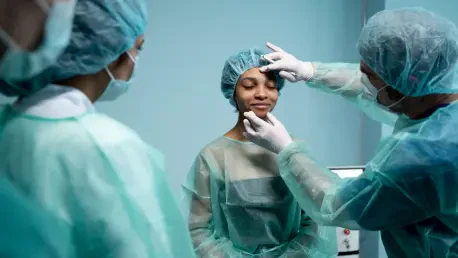In a nation where access to specialized medical care remains a distant dream for many, a remarkable initiative has emerged as a beacon of hope for underserved communities across India, bringing together local and international expertise. Each year, this collaborative effort provides free reconstructive surgeries to those grappling with severe physical deformities and injuries. Hosted at Ramakrishna Mission Sevashram Hospital, this annual camp represents a lifeline for individuals who otherwise could not afford such critical interventions. Organized by Akums in partnership with Rotary International Club and Interplast Germany, the program addresses complex conditions like burn injuries, trauma damage, and tumors, restoring not only physical health but also personal dignity. The impact of this initiative extends beyond medical treatment, offering a renewed sense of confidence and social reintegration to hundreds of patients who have long been marginalized by their conditions.
A Lifeline for the Underserved
This initiative stands as a powerful response to the healthcare disparities faced by many in India, particularly those in rural and economically challenged areas. Running for over a decade, the camp operates for ten days each November, targeting individuals with severe physical challenges that hinder their daily lives. Around 150 to 200 patients benefit annually from free surgeries that tackle issues such as deep wounds and complex deformities, ensuring that no one is turned away due to financial constraints. The program prioritizes clinical needs, focusing on transformative procedures rather than cosmetic requests. By providing these services at no cost, the camp alleviates the burden of expensive medical care, which often forces families into debt or leaves conditions untreated. The dedication to accessibility ensures that even the most vulnerable can access world-class surgical expertise, creating a ripple effect of improved health and well-being across communities.
Beyond the operating room, the camp fosters a sense of hope and renewal among its beneficiaries, many of whom have endured years of stigma due to their conditions. A striking example is a patient from Bijnor who suffered severe burns in an electrical accident and underwent multiple surgeries through this program. The procedures not only restored physical mobility but also rebuilt personal confidence, enabling a return to a more active and fulfilling life. Such stories highlight the profound emotional and social impact of the initiative, as patients often return for follow-up treatments, reflecting the trust built over years of consistent care. This sustained engagement demonstrates how medical interventions can go beyond physical repair, offering a pathway to reclaiming identity and societal acceptance for those who have long felt isolated by their injuries or deformities.
Strength in Collaboration
The success of this surgical camp hinges on a robust partnership among diverse organizations, each contributing unique strengths to deliver high-impact healthcare. A team of twelve skilled surgeons from Interplast Germany leads the effort, bringing specialized expertise to handle complex reconstructive cases over the ten-day period. Their international perspective complements the local knowledge provided by Akums’ clinical staff, who manage essential aspects like wound care and recovery support. Meanwhile, Ramakrishna Mission Sevashram Hospital offers critical infrastructure and personnel for pre- and post-operative care, ensuring a seamless patient experience. Rotary International, along with its women’s wing, facilitates communication between Hindi-speaking patients and the German medical team, bridging cultural and linguistic gaps. This coordinated effort exemplifies how global and local entities can unite to address pressing medical needs effectively.
Further enhancing the initiative’s reach is the shared commitment to compassionate care that binds these partners together. Archana Jain, Secretary of Akums Health & Educational Society, has emphasized the camp’s role in serving those with nowhere else to turn for help. Her insights underscore the importance of reconstructive surgery in not only improving health outcomes but also elevating quality of life for the most disadvantaged. The sustained involvement of Interplast Germany adds a layer of credibility, showcasing a cross-border humanitarian effort rooted in professional excellence. This collaboration serves as a model for how diverse groups can pool resources and expertise to create meaningful change, addressing systemic gaps in healthcare access while prioritizing dignity for every patient. The synergy among these organizations ensures that the program remains a vital resource for underserved populations year after year.
Building a Model for the Future
The enduring impact of this surgical camp reflects a growing recognition of collaborative healthcare models as viable solutions to address critical medical access gaps. Over fourteen editions, the initiative has seen an increasing number of beneficiaries and refined coordination among partners, positioning it as a replicable framework for similar efforts. The success lies in its ability to prioritize vulnerable groups, leveraging combined resources to deliver specialized care where it is most needed. This approach not only meets immediate medical demands but also sets a precedent for how public-spirited organizations can work alongside international volunteers to create lasting social impact. As healthcare inequities persist, such initiatives highlight the potential for scalable solutions that can inspire broader systemic change across regions facing similar challenges.
Looking back, the camp’s legacy over the years reveals its transformative power in both individual lives and community perceptions of accessible healthcare. It addresses urgent medical needs while fostering long-term rehabilitation for countless patients who regained their place in society. The partnerships forged during these efforts stand as a testament to collective action, showing how local and global entities bridge gaps in specialized care. Moving forward, the focus should remain on expanding such programs to reach even more underserved areas, ensuring that the momentum of this initiative continues to grow. Exploring ways to integrate training for local surgeons or securing additional funding could further enhance sustainability, offering a blueprint for tackling healthcare disparities on a larger scale. This collaborative spirit holds the key to shaping a future where no one is left behind due to lack of access to life-changing medical interventions.









